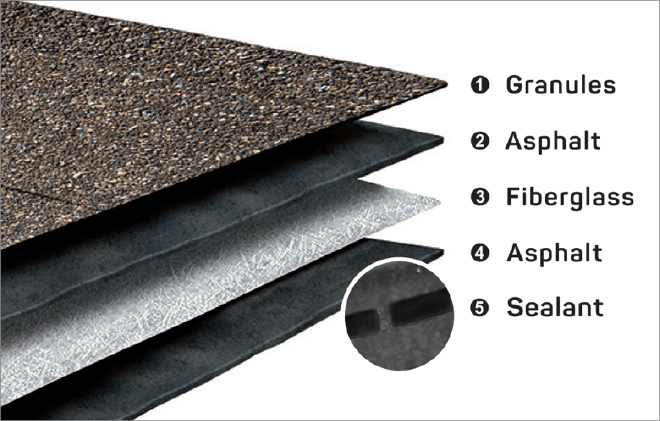Asphalt roof shingles dominate the steep-slope roofing market in Wake County, accounting for up to 90 percent of all of North Carolina’s residential roofs.
Although asphalt shingles have been popular for more than 100 years, we’ve seen a few improvements made over the last few decades. These include fiberglass reinforcing mats, self-sealing tabs and laminated construction.
Asphalt shingles can be “organic” (paper with an asphalt coating) or fiberglass. Both types are treated with a protective resin coating to make them water-resistant. “Architectural shingles” are a thicker type of asphalt shingle bonded with a special sealant that have a distinctive, textured appearance.
Roof Shingle Problems
Here at Statewide, we advise that you need a new roof when at least 30 percent of the roof needs attention. Also, if your house is 20 years old or more you might be due. Of course, other circumstances might make shingle replacement more urgent. Overhanging tree limbs can brush against shingles and wear away the protective top layer, for example. Wind and hail damage can take their toll.
As for the typical shingle problems we see on Wake County roofs … Are your shingles shedding their outer granules? Are your shingles curling on the edges? Are they cracking? Are they brittle? All these issues and more could be an indication that a new roof is going to be required at some point in the future.
Once you’ve had shingles installed, look for granule loss from individual shingles. Typically, these embedded pebbles may loosen a bit during shipment and installation. This is why part of the clean-up from a newly shingled roof should include gutter cleaning. You should also watch out for improper nailing and improper flashing.
Asphalt Shingle Construction
The durability of an asphalt shingle depends on how it is made. The strength of the reinforcing mat, the flexibility and durability of the asphalt, the thickness and coverage of the granule layer, and the holding power of the sealant all affect the way the shingles function. Defective asphalt shingle product material can lead to thermal splitting, cracking, blistering, staining, and in some cases curling or cupping shingles.
Every asphalt shingle contains these elements:
- Inner reinforcing mat
- Coating of hard asphalt modified with mineral fillers
- Top surfacing of mineral granules
- Back-surface dusting of finely ground mineral dust
- A stripe of adhesive sealant across its center to hold shingle edges down when the wind blows
Shingle brands differ in all sorts of ways, but the most critical factors seem to be the strength of the mat and the quality of the asphalt. Let’s look at each of these elements.
Two types of reinforcing mats are common in the shingle industry: non-woven fiberglass mats and organic felt mats.
- Organic mats are made of wood fibers and recycled paper. They are saturated with a soft, pliable asphalt that binds the fibers together and protects them from water. Organic mats are thicker, heavier, and stronger than the fiberglass mats.
- Fiberglass mats are bound together with a phenolic adhesive. They are lightweight and they don’t have to be saturated with asphalt, since they are water-resistant.
Organic shingles use a soft saturating asphalt in the mat and a harder, filler-modified coating asphalt for the top and bottom surfaces. The asphalt used is an end-product of oil refining. It’s not quite the same as asphalt you see on roads—it is processed for a higher degree of toughness.
The asphalt formulas used have also been been changed, sometimes for better and sometimes for worse. Some composite roofing shingle made in the 1980s and 1990s turned out to be duds.
Fiberglass shingles have just the coating asphalt, and so use less asphalt overall.
The most visible aspect of asphalt roofing shingles is the stone granule surfacing. Colored ceramic or hard rock is crushed and screened to exact granular size specifications to create this layer, which adheres to the exterior of your shingles. Uniform granule loss is considered normal wear and tear for an asphalt roof. Shingles splitting and cracking, on the other hand, is a problem.
If you see cracks in the granule layer, there isn’t necessarily an immediate concern (other than cosmetic), but cracking in your shingles that extends through the shingle matrix (not just the granule surfacing) means the integrity of the shingle has been compromised and it may no longer be waterproof.
Home and business owners in Wake County should inspect their south-facing and west- facing roof slopes regularly. These sides of our roofs get the most precipitation and heat exposure. Premature granule loss may occur under extreme temperatures caused by hot summers or by improper attic ventilation. Even small areas of gravel loss can put your shingles at risk of premature failure due to UV penetration (sunlight), causing deterioration of the asphalt layer.
Statewide Construction LLC can take some of the guesswork out of your roof problems. We are Licensed General Contractors serving the Wake Forest and Raleigh area with roofing, interior and exterior remodeling, including restoration and water damage projects. If you think it may be time for a new roof, get in touch with Clay and he’ll help you make a the right decision for your home or business.
